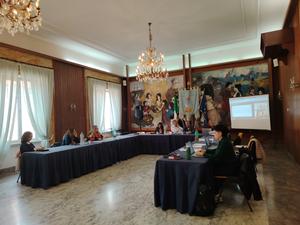ENTRACK: Local Engagement for an Inclusive Energy Transition

On November 14, 2024, an institutional workshop was held in Piano di Sorrento as part of the Municipality- Region Partnership of the ENTRACK project, aiming to promote an inclusive energy transition through the active involvement of citizens and local stakeholders.
During the event, the results of ethnographic research conducted in Piano di Sorrento and Vico Equense were presented, involving 181 citizens. Qualitative interviews revealed widespread ecological awareness, virtuous energy consumption practices, but also challenges related to costs, bureaucracy, and infrastructure limitations. The importance of clear and accessible government incentives, educational campaigns, and improvements in public transport was emphasized. Cultural change was recognized as both a challenge and an opportunity to engage younger generations in more sustainable behaviors. Overall, the experience of the Climate Explorers demonstrated the value of participatory engagement, contributing to the creation of knowledge and awareness at the local level.
In addition, the Taxonomy of Plans, Strategies, and Energy Policies—a mapping of Italian socio-energy policies—was also presented. This highlighted a strong presence of strategies for environmental and territorial cohesion but revealed the absence of a specific plan to combat energy poverty.
The workshop continued with a presentation by Luigi Acquaviva on the Campania Regional Program FESR 2021-2027 and the 2019 Campania Regional Energy and Environmental Plan (PEAR).
The former focuses on five main challenges, consistent with ENTRACK’s activities in Vico and Piano:
1. A smarter and more competitive Campania;
2. A greener Campania;
3. A more connected Campania;
4. A more inclusive Campania;
5. A Campania closer to its citizens.
In the afternoon, Federica Ragazzo (RETE ASSIST) led a self-assessment activity with municipal technicians, comparing citizen perceptions gathered by the Climate Explorers with those of the involved technicians. The discussion revealed some difficulty in transferring information about local initiatives to citizens. However, specific local incentives to promote the adoption of clean energy practices in the community are still lacking.
With the support of AISFOR, RETE ASSIST, and Kilowatt, the workshop represented a significant step toward a fairer and more sustainable energy transition in the two municipalities.
 Print
Print